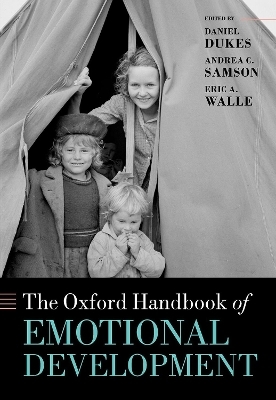
The Oxford Handbook of Emotional Development
Oxford University Press (Verlag)
978-0-19-885590-3 (ISBN)
Emotional Development is a topic that embraces a range of disciplines, including, psychology, neuroscience, sociology, primatology, philosophy, history, cognitive science, computer science, and education.
The Oxford Handbook of Emotional Development is the first volume of its kind to include such a multidisciplinary group of experts to consider this topic, and as such, provides perhaps the most complete examination yet of how emotions develop and manifest themselves neuronally, intra- and interpersonally, across different cultures and species, and over time.
The volume is separated into five themes: macro and micro underpinnings; communication and understanding; interactive contexts; socialization and learning; and morality and prosocial behaviour. Each section includes contributions from researchers in at least three disciplines, resulting in a volume that is destined to provoke the interested reader into either purposively or accidentally discovering emotional development from novel and stimulating perspectives. The chapters are written to be concise in their overview and accessible to the researcher or intellectually curious person alike. The reader can enjoy state of the art critical analysis of emotional development from different viewpoints, which, whether dipped into casually or read as a whole, will provide the best view of not only what we know today about emotional development, but also where the future study of emotional development lies.
The Oxford Handbook of Emotional Development is an original and important contribution to the literature in psychology and the affective sciences.
Daniel Dukes worked in special education before returning to academia. He is currently a postdoctoral researcher at the University of Fribourg and is Co-General Editor of the Studies of Emotion and Social Interaction series at Cambridge University Press. His research mainly focuses on socio-emotional development and processes, including affective social learning. Andrea C. Samson is Associate Professor in psychology at Unidistance, Switzerland and holds a Swiss National Science Foundation-funded professorship at the Institute of Special Education, University of Fribourg. She is the director of the chEERS Lab, a team of researchers interested in socio-emotional processes in developmental disorders and intellectual disabilities. Eric A. Walle is an Associate Professor of Psychological Sciences at the University of California, Merced. He is the Director of the Interpersonal Development Lab and conducts research examining emotion, socio-emotional development, and developmental transitions. He also serves on the Executive Board of the International Society for Research on Emotion.
Section One: Theory
1: Colin Holbrook and Jennifer Hahn-Holbrook: Evolved to learn: Emotions as calibrational adaptations
2: Peter Stearns: Changing standards in emotional development: The history factor
3: Jonathan Turner: Why Are Humans So Emotional? An Explanation from Evolutionary Sociology
4: David Rudrauf, Andrea Samson, and Martin Debbané: Current challenges and advances in computational and artificial agent modelling for the simulation of social affective learning and regulation of motivated behaviours
5: Eric Walle: The Development of Appraisals and Discrete Emotions
6: Rista C. Plate, Kristina Woodard, and Seth D. Pollak: Statistical Learning in an Emotional World
7: Michaela Riediger and Jennifer Bellingtier: Emotion Regulation Across the Lifespan
8: Kalee De France and Tom Hollenstein: The development of cognitive reappraisal to regulate emotions from infancy to adolescence
Section Two: Communication & Understanding
9: Yena Kim and Kret Mariska: The function of emotional expressions: An ontogenic and phylogenic comparison
10: Karen Vallgårda and Stephanie Olsen: Historicizing Emotion Development
11: Kristin Lagattuta and Hannah Kramer: Developmental Changes in Emotion Understanding During Middle Childhood
12: Sherri Widen and Nicole Nelson: Differentiation and language acquisition in children's understanding of emotion
13: Gina Mireault: The social and affective power of humor in infancy
14: Jennifer Silvers and Adriana Mendez Leal: Neuroscientific approaches to the study of self- and social emotion regulation during development
15: Caitlin Conner, Andrea Trubanova Wieckowski, Taylor Day, and Carla Mazefsky: Emotion Development in Autism
16: Lizet Ketelaar, John Lambie, Boya Li, Adva Eichengreen, Anat Zaidman-Zait, and Carolien Rieffe: Impact of hearing loss on children's emotional development and mental health
Section Three: Interactive Contexts
17: Vasudeva Reddy and Vanello Daniel: Emotional Engagement and Social Understanding
18: Michael Mascolo: Emotions as Felt Patterns of Engagement: A Relational-Developmental Approach
19: Zanna Clay, Christine Webb, Teresa Romero, and Frans BM de Waal: Comparative perspectives of socio-emotional development: Insights from chimpanzees and bonobos
20: Jessica Lougheed: Developmental Methods for Emotion Dynamics
21: Daniel S. Messinger, Jacquelyn Moffitt, Samantha G. Mitsven, Yeojin Amy Ahn, Stephanie Custode, Evgeniy Chervonenko, Saad Sadiq, Mei-Ling Shyu, and Lynn K. Perry: Early interaction: New approaches
22: Claudia Haase, Emily Hittner, and Jacquelyn Stephens: Emotion Regulation in Couples Across the Life Span
23: Guida Veiga, Brenda MS da Silva, Jenny Louise Gibson, and Carolien Rieffe: Play and emotions; the effect of physical play on children's social well-being
24: Andrea Samson, Linda Dell'Angela, David Sander, and Alexandra Zaharia: The potential of board games to promote emotional competences
Section Four: Socialization and Learning
25: Rebecca J. Erickson and Marci Cottingham: Emotion Development in Context
26: Fabrice Clément and Daniel Dukes: Affective Social Learning: a lens for developing a fuller picture of socialization processes
27: Tanya Broesch & Jeremy Carpendale: Emotional development across cultures
28: Amy Halberstadt: Emotions as Fixatives for Children's Understandings about the World
29: Jeffrey Liew and Qing Zhou: Parenting, Emotion Regulation, and Psychosocial Adjustment in Chinese and Chinese Immigrant Children and Adolescents
30: Stephanie Olsen and Karen Vallgårda: Emotional Frontiers
31: Rheinard Pekrun: Development of achievement emotions
32: Bruce Maxwell and Joanna Peplak: Educational Applications of Social and Emotional Learning: A Review of Normative and Conceptual Critiques
Section Five: Morality and Prosocial Behavior
33: Elliot Turiel: The development of moral judgments, emotions, and sentiments
34: Steve Hitlin and Sarah Harkness: Inequality and Moral Emotions
35: Mario De Caro, Maria Silvia Vaccarezza, and Ariele Niccoli: Emotional skilfulness and virtue acquisition
36: Amrisha Vaish: The prosocial functions of guilt in early childhood
37: Gustavo Carlo, Paul D. Hastings, J. Logan Dicus, and Elisa Ugarte: Development, Culture, and Neurobiology of Moral Emotions in Ethnic/Racial Minority Children: A Case Study of U.S. Latino/a Children
38: Aleksandra Petkova and Celia Brownell: I feel, you feel, we feel: The role of emotion in early prosocial beahvior
39: Ross A. Thompson: Emotional development and the growth of moral self-awareness
40: 1. Karine M.P. Viana, Juliana Lucena, Imac Maria Zambrana, Paul L. Harris & Francisco Pons: Emotion understanding and cooperative problem-solving in children
| Erscheinungsdatum | 21.01.2022 |
|---|---|
| Reihe/Serie | Oxford Library of Psychology |
| Verlagsort | Oxford |
| Sprache | englisch |
| Maße | 180 x 251 mm |
| Gewicht | 1234 g |
| Themenwelt | Geisteswissenschaften ► Psychologie ► Entwicklungspsychologie |
| Naturwissenschaften ► Biologie ► Humanbiologie | |
| Naturwissenschaften ► Biologie ► Zoologie | |
| ISBN-10 | 0-19-885590-7 / 0198855907 |
| ISBN-13 | 978-0-19-885590-3 / 9780198855903 |
| Zustand | Neuware |
| Informationen gemäß Produktsicherheitsverordnung (GPSR) | |
| Haben Sie eine Frage zum Produkt? |
aus dem Bereich


